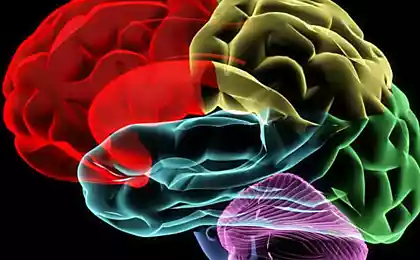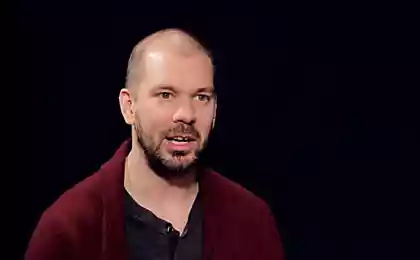551
Why do we always feel busy
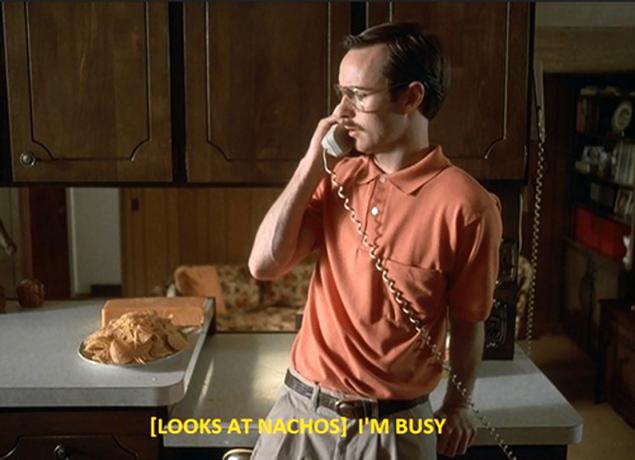
In the modern rhythm of people constantly in a hurry. Constantly busy with something. No enough time. Will call a friend with a proposal to go to the gym or in the bath — he can't, because again, busy. It seems the problem is the last time. Before it was somehow easier...
The question arises: do all so busy or just feeling busy?
In recent years many published studies (1, 2) with evidence that people work less hours and take more vacations. Some work from home. A much larger number of employees than before, underemployed. So what happens?
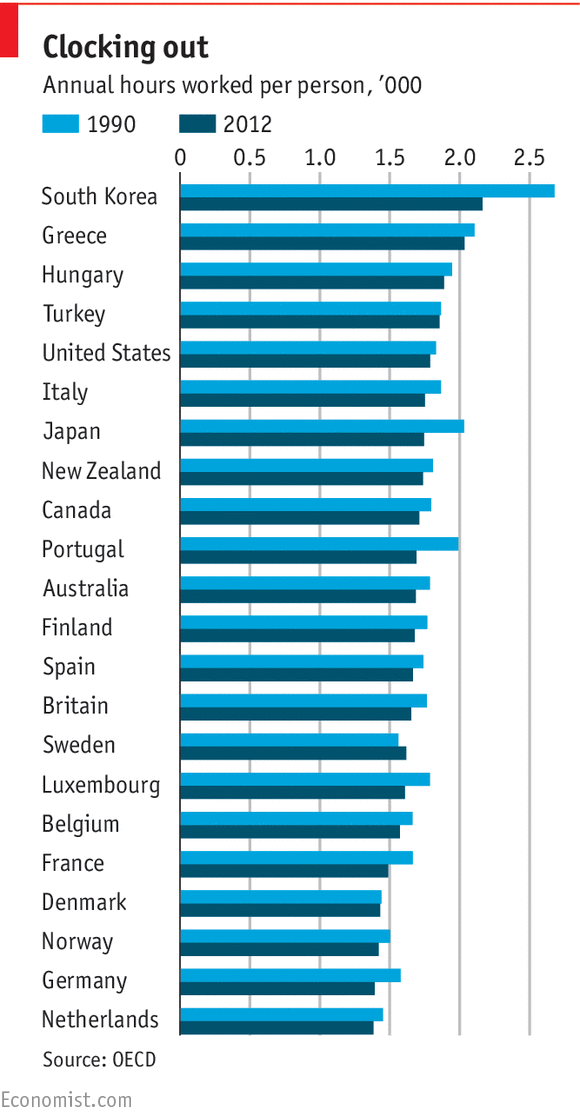
Average number of hours worked (thousands) in different countries in 1990 and 2012, the source
Among sociologists the prevalent hypothesis that the cause of "permanent employment" is technological progress. It would seem that the ubiquity of home appliances should free up more time. People can easily relax and relax, while a washing machine, a dishwasher and a robot vacuum cleaner doing its work. Science fiction writers and futurists of the past almost unanimously predicted an offensive in the future "lazy era" when robots do all the work, and the people relax and rest. Yes, robots really started to do a large amount of work around the house. But for some reason this forced most people to relax and unwind.
In 2012 the UK held a special Work Audit study in which I compare the work and life of citizens in 1952 and 2012. The study authors noted that 60 years ago only every fifth household had a washing machine, in every tenth phone in every twentieth — fridge. Almost no one had Central heating. Less than half of the people had a TV. For comparison, the modern British have it all, even the relatively poor citizens. Scientists emphasize that in our time is to work fewer hours to obtain a much higher standard of living than our ancestors of 60 years ago who worked a full day and more.
The researchers say the increased stress associated with work:
The rapid spread of digital information technologies in the workplace has created opportunities for greater autonomy of workers, including by doing more work at home, but has also led to information overload, write the authors of the report — blurring the boundaries between work and off-duty time and allowing more sophisticated monitoring and surveillance of employees.Another trend. Over the last 60 years have significantly increased the share of workers of intellectual labour (in the UK from 25% to 44%), while decreased the number of "blue collar" — that is the simple hard workers who work by hand. It is possible that this also has something to do with a permanent state of stress and "employment". People working at the plant, will not permanently hang in the smartphone and laptop after hours, to check business mail, Skype and chat in Slack. He can completely turn away from work and totally relax, in contrast to the employee IT. Studies show that less-educated people usually have more free time.
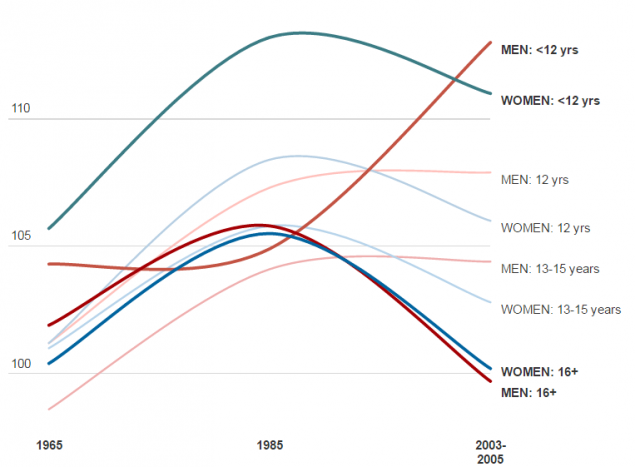
The free time of Americans (hours per week) depending on the level of education (in years), including sleep time, in the years 1965-2005 source
Last year psychologist OIF Macloughlin (Aoife McLoughlin) from Singapore at James cook University has put forward another interesting theory is that the technical gadgets speed up the processing of information by the brain and, thus, distort the subjective perception of time. It seems that time is becoming a more information-rich, brain doping" constantly backs up, motivates, requires new information.
This pace of life allows you to work more efficiently, faster to perform tasks, but long-term effects of such "technotopia" can be unpleasant. It's stress, chronic fatigue syndrome, sleep disturbances, increased levels of depression, dissatisfaction. Worse people feel the taste of life and seemed to cease to experience happiness from the very fact of its existence.
"We like trying to emulate a technology to be faster and more efficient," says McLoughlin. — It seems that in the technology there is something that ignites us and customize an internal timer which measures a passing time."
Scientists recommend periodically synchronize and stop the internal timer. For that they recommend at least once a week to disconnect from the Internet and social networks.
American psychologists in 2003 published a scientific paper that is too large choice of activities causes stress and anxiety for the average person.
It is known that the brain is easier to choose two or three options out of 20 options. That is, the abundance of recreational options does not contribute to a better and more quality rest, according to scientists. On the contrary, in humans, there is a feeling of lack of time, stress. There is a sensation of "pressure of time" (rush) and "loss of time" (hence the sense of permanent employment).
We emphasize that this study is more 2003 (!) year, when the abundance of entertainment was more modest than now.
The importance of the deprivation of consumers of a large number of options to relieve their stress, wrote psychologist Barry Schwartz in his famous book "the Paradox of choice". His advice is used by many successful manufacturers of consumer electronics. For example, Apple offers only two or three options of their smartphones and computers, not to cause alarm among the inhabitants.
Another reason why people constantly feel busy, it can be subconscious in nature. In the 19th century, the absolute symbol of wealth, success and social status was the freedom from work, idleness, leisure. In the 21st century efficiency, employment are considered as indicators of high status. If a person is constantly busy — before he was worthy of pity, condescension. Now there is: "of Course I'm busy, I'm a very important person!". Studies suggest that modern man prefers to be employed: a highly intelligent creature is not able to be a long time in idleness. He's bored.
Why do people constantly feel busy? There is still no clear answer to this question. Most scientific research is based on surveys. Unfortunately, many people refuse to participate in surveys because... they are too busy.
Source: geektimes.ru/post/280536/

